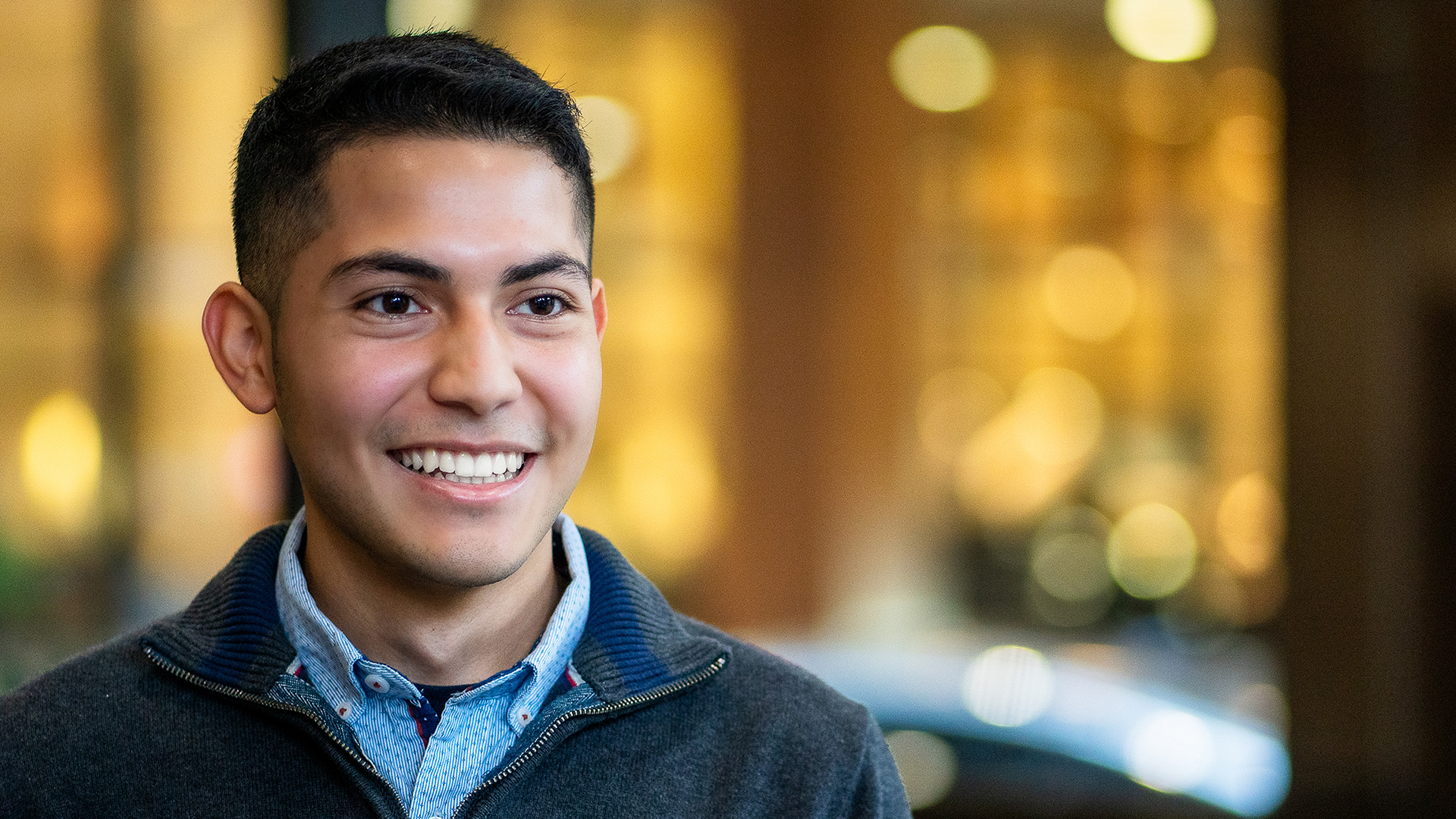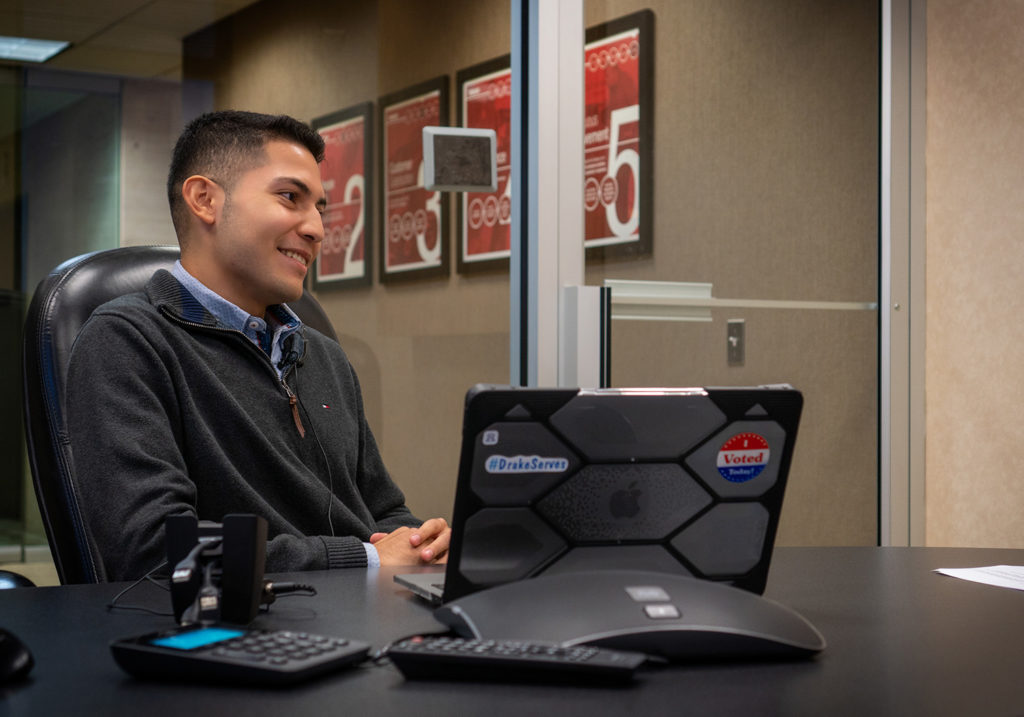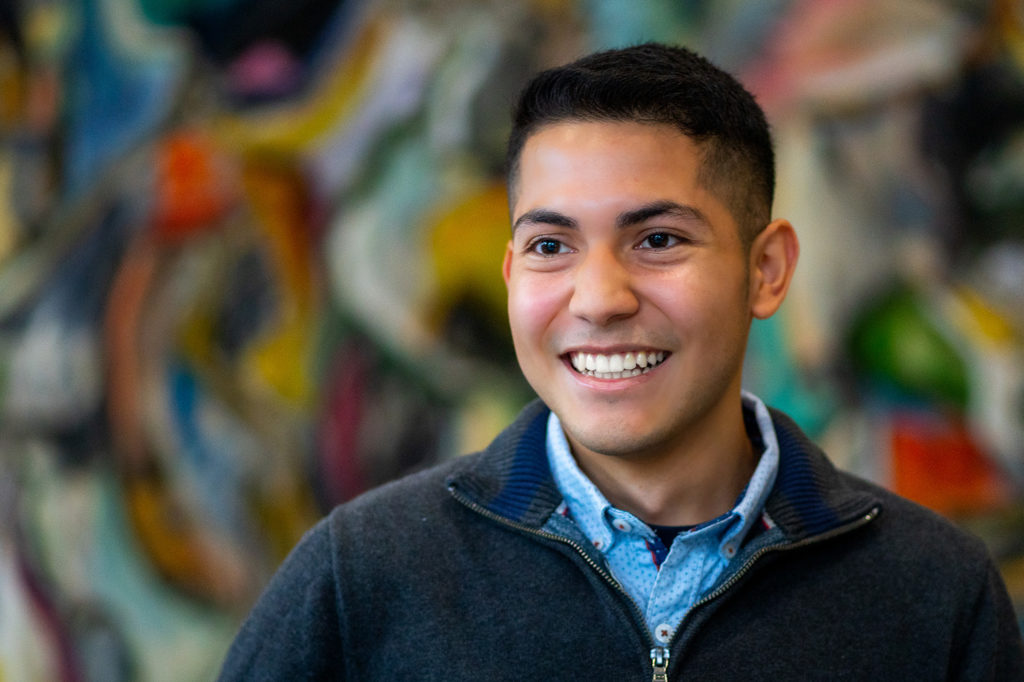
Louis Moreno
Louis Moreno, a student at Drake University studying economics and business administration, is one of the first graduates of the Ruan Information Technology Apprenticeship Program. In the two-year program, he helped roll out new mobile logistics software used by thousands of Ruan drivers — and completed high school concurrently. For Louis, integrating tech with other disciplines is essential for all future professionals — and he says there are a lot of compelling ways for young people to pursue that early in their academic journeys.
You recently graduated from Ruan’s apprenticeship program, where you worked on the IT team while attending Lincoln High School and Central Campus. How did you get involved in this program?
The previous Central Campus director was starting to talk with a lot of businesses and said, ”Hey, we’ve got great students—come visit us,” Tand they ended up scheduling a visit with the Ruan team. Their ultimate goal was to get a Registered Apprenticeship Program started that was recognized by Iowa Workforce Development. Our teacher said, “Alright guys, I’ve got big news. Cool things are going to happen, and this is probably going to change some of your lives, but it’s going to take a commitment.”
My previous job was working at a grocery store, so I had built up a lot of soft skills by talking to customers. That benefited me a lot to be able to come to my interview and say, ”Hey, not only do I have the technical skills that you’re looking for, but I’ve got a little bit of experience with the soft skills.” I was able to look at the program and see this is an opportunity that’s in front of me, and I wanted to take it. I used my dad for inspiration. My dad worked as a cook for 20-some years. He went back to DMACC to study some technical skills for maintenance. About two years after getting his certification, he’s working as a maintenance supervisor and making almost triple what he used to make as a cook. Looking at my dad, what he can do in six months with his education, I thought, Well, I have all these certifications at Central Campus and I’ve been taking these college classes. What can I do with them? When Ruan came knocking, I was there. I definitely wanted to take that opportunity as fast as I could.
For the day of the interview, I made a portfolio with accomplishments from high school like a good GPA, honor roll, some of my certifications from IT, and a letter of reference from my grocery store job. I told the person who was interviewing me that this is what I’ve accomplished so far, this is what I’m passionate about, and I want to bring that same passion and dedication to Ruan. They loved it. It was a great feeling to come home and tell my dad that I nailed the interview.

You and the other apprentices played an essential role in helping Ruan launch their new mobile tech platform. What all did your job entail? What were you responsible for?
Across Ruan, there are roughly 3,600 trucks that are spread across about 300 operations nationwide. We needed this new technology to meet the federal electronic logging device mandate. That is a physical device that’s in the truck, and in four easy steps it records, certifies, transfers, and reviews. The record part would be getting a unique driver ID and driver truck ID associated and recording things such as odometer miles and movement. The certified part would be when the driver logs in and starts taking hours of service. Drivers are limited in how many hours a day they can drive, and the driver would be able to take a look at the log and see if their hours are correct. Next would be transfer, so making sure that all that information that’s collected is integrated correctly into the system so we have accurate times on our order numbers. And lastly, for review, making sure that when we double-check that data that it’s all correct, it’s all integrated, and it’s not giving us any failures. So it does help follow the regulations in the business, and it’s a pretty revolutionary system compared to what we had before. It integrates really simply around the administration. It’s a breeze for us to configure and administer.
Once all the background work was done by the full-time employees, the apprentices pretty much took it over, and with a little bit of leadership we were able to turn it into a successful rollout. It’s a great feeling to say that I’m a part of a successful ELD [electronic logging device] rollout.
We had apprentices in the program as early as the app development stage, but my role came in after ] the rollout, when we were getting shipped hundreds of tablets and needed to set them up with our administration software. My primary role was deploying tablets and setting them up. Later on in the rollout, we ended up doing a lot of administration on the website.
How does an apprenticeship experience compare to a traditional internship?
You’re going to get out of the program what you put into it. And that’s true pretty much with any apprenticeship or internship. You can go and work your eight hours a day and go home at the end of the day, that’s fine. But if you go in to work every day and you see what needs improvement or what else you can do, and you go that extra mile, people will start to notice.
An internship typically lasts four months over the summer, while an apprenticeship is a two-year program where you are required to work 2,000 hours to get your certification. It’s a lot more involved because of the time commitment and because you get to know the team pretty well. Not only do you build the fundamental skills to be proficient at the job, but you are able to build other skills that you wouldn’t typically get in an internship. In the Ruan apprenticeship, they’re most focused on getting apprentices to have a jack-of-all-trades understanding of what IT is.
It’s also different from an internship in the fact that you are getting a wage for your work. That helps you stick to it and really commit. This is the first Registered Apprenticeship Program for IT that’s been completed in Iowa. It’s impressive that we have this apprenticeship for highly skilled work. It’s a head start to someone’s career in IT, because not only do you get your classroom experience, but you get two years of work experience, and you’re getting paid on top of it all.
Not only do you build the fundamental skills to be proficient at the job, but you are able to build other skills that you wouldn’t typically get in an internship.
What was your favorite part of working on the IT team at Ruan?
First off, it’s the company culture. Ruan is a family-owned business, and they have that feel. My second week here, I didn’t know the Ruan CEO, Ben McLean, so I sent him a meeting invite, he accepted it, and I was able to go up to his office, introduce myself as an apprentice in his new program, and have a chat. It was a great experience, and to this day Ben and I stay in touch.
How did you balance the apprenticeship and going to Lincoln High School?
I had a terrible balance, but I used it as a learning experience for when I got to Drake. If I didn’t have that experience at the high school level, I probably would have had a tough time at the college level, and I wouldn’t have been able to get to the point I am at now.
When I was in high school, because I didn’t physically go to class I wasn’t doing the work, and my grades ended up dropping and I got a lot of calls from my teachers. I met with my teacher and made a game plan for what I needed to do and how I needed to refocus.
I also had a meeting with the Ruan CIO, and he had some really good advice. He said, first off, I needed to prioritize what needs to be done. It’s pretty obvious that if I didn’t do my schoolwork, I couldn’t continue the apprenticeship program. The second piece of advice was to make sure the math is right. The math, in this case, would boil down to hours per week, so I needed to make sure I was spending enough time in class, enough time at work to meet the requirements of the apprenticeship program, and then I was still a 17-year-old kid in high school—so I needed to make sure I had enough time to do homework, my hobbies, sleep, and still enjoy being a kid. Last, he told me not to be afraid to say no, because opportunities are still going to be waiting, even if they aren’t necessarily in the same form.
What interests you about tech?
Technology is the way of the future—it doesn’t matter what job you are going to have. One way or another, technology will integrate into what you do on a daily basis, and being able to have a deep understanding as to how that technology works will make you more efficient and more successful in a competitive business place.
Why should Iowa students stay in the state for careers in tech?
There is a need for tech jobs. It’s a growing industry, and there will be a job for you if you study tech and use your network. If those jobs don’t exist today, tomorrow’s future will have them for you.
Next, you’ll have a part-time college internship role with Ruan while attending Drake University. Why did you choose to stay in Iowa for college?
The reason I stayed in Iowa for college is Drake was my first pick. It’s pretty much where I’ve been dreaming to go. I live in the suburbs of Des Moines, so being able to go to Drake is a nice commute and I live at home and save a lot of money. Additionally, I have a job downtown at Ruan, so my commute from school to work and home isn’t too far. It lines up with what I plan to do in the future.
What are you studying at Drake? Where do you see your career going next?
I’m majoring in economics and business administration, and I’m planning on going to Drake University Law School afterward. I want to pursue a career in civil law, and law is such an expansive field that no matter what I end up choosing, I can somehow find a way to relate it back to technology. I want to specialize in intellectual property, contracts, or things to do with business law. My job at the Ruan service desk lets me impact the lives of 30 people a day, which is a satisfying position, but I want to have a bigger impact. I can study law and find a way to integrate that with technology. For example, working with regulation of cybersecurity, or intellectual property for software licensing.
The focus of the 2019 Catalyst Series is telling stories through the lens of tech leaders from underrepresented groups. From your perspective, why is diversity and inclusion important for Iowa’s tech community?
Getting into technology was quite intimidating because of how young I am, but also because a lot of the people in tech don’t look like me. And they aren’t always fluent in Spanish. If I have a question about something and I don’t know the word in English, I’m not able to rely on my Spanish to help me out.
Diversity is truly important in any field, really, because it helps to inspire more change. Having that different perspective allows new ideas to flow and different innovations to be created and implemented. And a lot of times, those innovations allow for greater change than just what was initially proposed or planned.
I want to inspire people in the Hispanic community to be able to see the path that I took and say, “Hey, Louis can go and be a catalyst, Louis can get this apprenticeship and go to college. That’s something I want to do and I can follow that path.” I want to be able to inspire young Hispanic Americans and show pretty much people from any group that these opportunities are out there and it doesn’t matter who you are. You can take advantage of them because they are waiting for you.

Having that different perspective allows new ideas to flow and different innovations to be created and implemented.
What are your interests outside of tech?
I like to play a couple of sports. When I was in high school, I was doing boxing at the Police Athletic League. My coach was a senior police officer. He was not only able to teach me the skills and footwork for boxing, but also discipline, rigor to see a project through, courage to really go out there, and endurance to not only get the momentum to start going down a path, but to finish. At Drake, I do tennis and intramurals, which are great because I get to connect with other Drake students and unwind at the end of the day.
What advice do you have for other students looking to get involved in Iowa tech or an apprenticeship program?
Do your research. Find a niche group in technology, something that you are interested in. The Iowa Technology Summit is coming up soon [September 30–October 1, 2019]. You might be able to ask your instructor to help you get a ticket for that event. There’s the Catalysts Live event in December, too [December 5, 2019], and there are going to be a lot of IT professionals there. There are also Lunch and Learns, where you can learn about new and innovative concepts, such as blockchain, and talk to a lot of different technology professionals about it. There’s also SecDSM, a monthly infosec meetup group where you can go and learn about different IT concepts and get a mentor if you look for one.
I’d recommend finding a mentor to guide you to where you want to be and how you get to that point. If you are going to those conferences, dress nice. Dress as if you are going to an interview, because that’s truly what it is. First impressions are lasting and they mean everything. Secondly, have some business cards ready so if they say, “Hey I like your vision. I want to make some of those visions happen,” you can give them a business card and actually follow up with them.
Also, take a day or two to let your thoughts percolate and decide what you want to do in the future. Decide where you want to be in your career, and think about what sort of education it takes to get there. What sort of connections do you need and how can you pull your network to get those connections to happen? Once you get that vision of what you want and how you are going to achieve it, narrow your focus and keep your eyes on the goal and keep pursuing it.
Once you get that vision of what you want and how you are going to achieve it, narrow your focus and keep your eyes on the goal and keep pursuing it.

